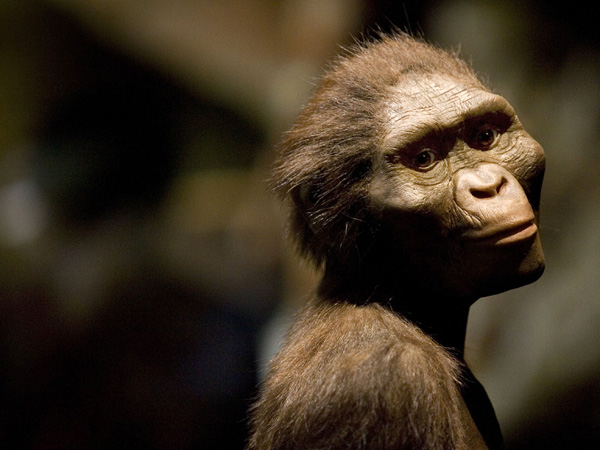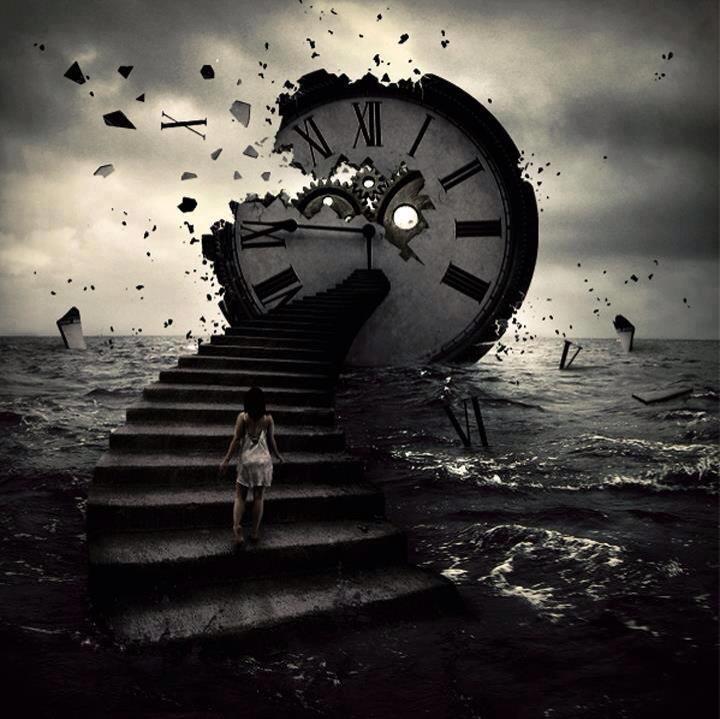A Great Blue Heron flies up to a branch from the stream about 30 meters downstream. It’s only visible through the thick foliage for a few seconds, but the sight of the huge bird lumbering into the air opens a portal to the past, to the age of the dinosaurs, and halts time.
Time was the first concept of man, and is the greatest enemy of the human being. There is no peace and renewal in time, and ‘eventually’ and ‘gradually’ never bring transformation.
Probably the first conscious thoughts of early humans were of time. The first time a hominid pointed at the sun in the morning, and then pointed to where it would be in the afternoon, and then to the spot where they were standing, he or she communicated, ‘meet here at that time.’
How long ago was that? As old as hunting and gathering. As old as the first division of labor. More than a million years, if crude stone tools are any indication.

Our hominid ancestors ago were far from being fully human, but then, we are far from being fully human beings. I feel the pathless path to growing into an intelligent species is regularly ending time, which allows us to transcend death.
In this age of science, astronomers often say that the Hubble in space, and the array of sophisticated telescopes on earth that cover the spectrum of visible and invisible light, are time machines. That’s because looking out into the universe is looking back in time.
Proxima Centuri, the closest star, is 4.2 light years from earth. That means when we view it through a telescope, we are seeing the star as it was four years ago, because that is how long it took its light to reach us.
The most distant observable object is the galaxy GN-z11, a mind-boggling 13.4 billion light years away. Astronomers say, rather ludicrously to my mind, that that means it took the light from GN-z11 13.4 billion years to reach the earth. But the earth is only 4.5 billion years old!
Therefore besides being an earth-centric view of the universe, that makes no sense in actuality. There is another way to view time however, philosophically if not scientifically.
The observation of a galaxy that no longer exists, on a planet that didn’t exist for another 8 billion years since the light we’re seeing through the Hubble left that galaxy, means that all events that have ever happened in the universe are enfolded in the present moment.
This is a staggering realization. It changes one’s basic view of time and space, and draws into question the existence of time as a scientific, much less psychological given.
So if the way astronomer’s speak of time is merely a convenient measuring stick, based on the random revolution of this watery rock around its sun, then how much more arbitrary is our psychological construct of time?
In other words, if time even in the way scientists speak of it doesn’t exist, how much more illusory is psychological time, which enslaves us?
What is meant by ‘ending time?’ Clocks certainly don’t stop, and the earth doesn’t halt its 24-hour rotation around the sun.

The ending of time means the movement of the past, as recorded consciously and subconsciously in the brain as memory, ceases to operate, at least temporarily (no pun intended) within us. That is at once a simple thing in essence to express, and a most difficult thing in practice for a human being to do.
Thought is time. Without the past moving through the present into the future conceptually and emotionally, there is no time. Conversely, without the movement of time as becoming, there is no psychological thought.
The ending of time in passive observation and undirected attention to the whole movement of thought (including and beginning with the illusion of the separate self) is the source of peace, renewal and communion with the immeasurable.
Ending thought/time does not come automatically with insights into the workings of the mind however. One has to make the space to end time through observation and attention, and take the time to make space for stillness and silence.
The continuity of psychological time and the fear of death go hand in hand. Every creature fights to live, but no creature fears death except man. With the ending of time, the actuality of death, which is in our every breath, draws near, without fear.
In making a friend of death, we transcend it. For what is death is one ends time and dies every day?
Martin LeFevre

